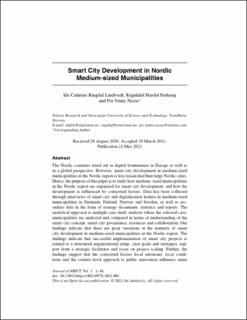Smart City Development in Nordic Medium-sized Municipalities
Peer reviewed, Journal article
Published version

Åpne
Permanent lenke
https://hdl.handle.net/11250/2823274Utgivelsesdato
2021Metadata
Vis full innførselSamlinger
Originalversjon
Nordic and Baltic Journal of Information and Communications Technologies. 2021, 2021 1-48. 10.13052/nbjict1902-097X.2021.001Sammendrag
The Nordic countries stand out as digital frontrunners in Europe as well as in a global perspective. However, smart city development in medium-sized municipalities in the Nordic region is less researched than large Nordic cities. Hence, the purpose of this paper is to study how medium- sized municipalities in the Nordic region are organized for smart city development, and how the development is influenced by contextual factors. Data has been collected through interviews of smart city and digitalization leaders in medium-sized municipalities in Denmark, Finland, Norway and Sweden, as well as secondary data in the form of strategy documents, statistics and reports. The analytical approach is multiple case study analysis where the selected case-municipalities are analyzed and compared in terms of understanding of the smart city concept, smart city governance, resources and collaboration. Our findings indicate that there are great variations in the maturity of smart city development in medium-sized municipalities in the Nordic region. The findings indicate that successful implementation of smart city projects is related to a structured organizational setup, clear goals and strategies, support from a strategic facilitator and focus on project scaling. Further, the findings suggest that the contextual factors local autonomy, local conditions and the country-level approach to public innovation influence smart city development. The paper provides originality and value by identifying characteristics on how smart city development is organized in medium-sized municipalities across Nordic countries, and how the development is influenced by contextual factors.
